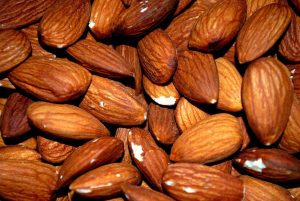
Almonds are a very healthy food. Almonds are loaded with healthy nutrients and minerals, including iron, potassium, calcium, magnesium, phosphorus, zinc, copper, and manganese. In addition, almonds are a good source of protein, fiber, and healthy fats, and they contain only a few grams of fat per serving. They also contain a unique and powerful phytonutrient called L-arginine. This is a unique amino acid found in few other foods in the world, such as beef and pork.
L-arginine is essential for men and women to maintain their cardiovascular health. L-arginine is also necessary for the synthesis of nitric oxide. Nitric oxide is one of the most important vasodilators in the body. When we eat foods rich in L-arginine, the body produces more nitric oxide, which relaxes blood vessels, thereby allowing more blood flow. The more blood flow the body gets, the more oxygen gets to the cells, and the more energy the body has to do its daily work. This is why L-arginine is essential for a healthy cardiovascular system.
Most people do not get enough L-arginine in their diets. That’s why we need to add more L-arginine into our diet. Almonds have over 3 grams of L-arginine. L-arginine from almonds is also easier for the body to absorb, since it is more bioavailable than other L-arginine rich foods.
Almond oil is a fantastic skin and hair moisturizer, with a gentle, not greasy feel. It contains high levels of vitamin E, which helps the skin to retain moisture. It also has a high content of essential fatty acids, which can help skin retain elasticity and firmness.
Almond oil has a low density, which makes it perfect for moisturizing, even the most sensitive skin. It is recommended for those with oily skin, eczema and psoriasis. Almond oil is not only a great skin moisturizer, but it has a high content of antioxidants that can help reduce signs of aging.
Eating almonds daily can help reduce the risk of type 2 diabetes and help keep blood sugar levels in check. Almonds are rich in vitamins, minerals, and antioxidants, and also contain monounsaturated fats and polyunsaturated fats, which are good for the heart. Additionally, almonds are a good source of protein, and contain the amino acid tryptophan, which is the precursor to serotonin.
According to a study published in the Journal of Nutrition in 2012, participants who ate almonds for one week and then were given a high-fat meal experienced reduced blood sugar levels.
Another study published in the European Journal of Clinical Nutrition in 2011 found that people who ate almonds with a meal had lower blood sugar levels than those who ate no almonds. In the study, the participants who ate almonds also reported feeling less hungry after eating their meal.
In a 2012 study in the journal Psychopharmacology, people who ate almonds experienced reduced levels of the stress hormone cortisol.
All of these studies have in common that participants who ate almonds experienced lower blood sugar levels, less hunger, and lower cortisol levels.
Almonds Are Loaded With Antioxidants
Almonds are a superfood. They are loaded with healthy fats and contain more antioxidants than any other nut. I eat almonds daily, and they have been a staple of my diet for many years.
Almonds are also a popular snack among children. However, there is not a lot of research on the health effects of consuming almonds as a snack.
How Do Almonds Contain Antioxidants?
Almonds are a very good source of vitamin E, vitamin K, magnesium, manganese, phosphorus, copper, and fiber. They are also a very good source of antioxidants such as vitamin E, vitamin C, carotenoids, polyphenols, and selenium.
Almonds are high in polyphenols, which are known to have antioxidant properties. They also contain a number of other antioxidants including carotenoids, polyunsaturated fats, and phenolic compounds.
Almonds Are Loaded With Fat
Almonds are a good source of healthy fats. They contain the same amount of protein as a handful of walnuts. They are a rich source of monounsaturated fats. Monounsaturated fats are healthier than saturated fats and are recommended for heart health.
Almonds contain a high amount of fiber. They have a low glycemic index and contain a high amount of protein. The protein in almonds is in the form of complete proteins, which include all eight essential amino acids.
How Should Almonds Be Snacked?
Almonds are best eaten when they are unsalted. If you are looking for a crunchy snack, you may want to try making your own almond butter. If you are looking for a snack that will satisfy your hunger, you may want to try almonds as a healthy alternative to chips.
You can sprinkle a handful of almonds on a salad, make a sandwich, or eat them with a piece of fruit. Almonds can be eaten as a snack any time of the day.
Almonds are in a class of nuts called the “good fats,” and they are also known as “nutritionally complete foods.” Almonds have been shown to lower cholesterol in a study that lasted just three months. The study participants were fed a diet that included almonds, which lowered their LDL cholesterol by 3.8%.

Different Forms of Almond
Almonds are available in many forms. The only one you need to watch out for are the dry-roasted ones that you find in the baking aisle. The ones in the shells are a healthy and delicious snack that is low in calories and rich in protein, fiber, and antioxidants. To add to their health benefits, they are also high in iron.
Almond Milk
If you have been feeling limited by the types of milk available at the grocery store, you should know that almond milk is an excellent alternative. One cup contains about 13 grams of protein, 15 grams of fat, and 3 grams of carbohydrates. It is also low in calories, low in sodium, and contains a number of beneficial nutrients, such as potassium, vitamins A, E, and B6, folate, and iron. It is also a good source of magnesium, calcium, copper, and zinc.
Almond Butter
Almond butter is another healthy and tasty snack to add to your pantry. It is high in protein and contains healthy fats. One tablespoon of almond butter provides 6 grams of protein and 2 grams of fat. It also contains several important nutrients, including vitamins B6 and E, iron, magnesium, potassium, and copper.
Almond Flour
If you are looking for a healthier alternative to bread, you should know that almond flour is a great option. One cup of almond flour contains 5 grams of protein, 9 grams of fat, and 4 grams of carbohydrates. It is also high in fiber and is a good source of magnesium, potassium, calcium, and copper.
Almond Oils
Almond oils are made from the nuts that are pressed from the almond. They are high in nutrients and are a great addition to salads, soups, and other dishes. One tablespoon of almond oil contains 15 milligrams of vitamin E, 1 gram of protein, 4 milligrams of iron, and 9 milligrams of monounsaturated fat. It is also high in zinc, magnesium, potassium, and fiber.
Almond Sprinkles
Almond sprinkles are another healthy and delicious snack option to add to your pantry. One tablespoon of almond sprinkles contains 6 grams of protein, 6 grams of fat, and 4 grams of carbohydrates. They are also high in vitamin E, iron, magnesium, and potassium.